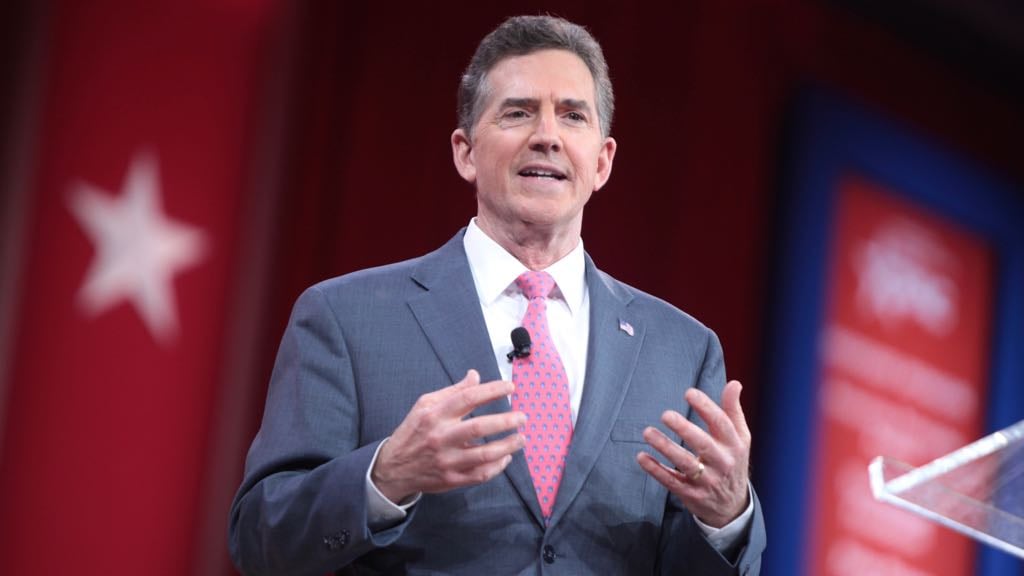Remember Jim DeMint?
He’s the senator from South Carolina who quit Congress in 2013 to become president of the conservative Heritage Foundation. He helped birth the careers of Ted Cruz and Marco Rubio. He spent the summer of 2013 on a cross-country “Defund Obamacare Tour” with Cruz, rallying voters around a government shutdown and criticizing other Republicans for not following suit. In 2014, when House Republicans raised the debt ceiling, DeMint promptly appeared on Face the Nation, lambasting the leadership. Politico even wondered whether his tactics and bombast had made him “the most hated man in Washington.”
But now, in a watershed moment for conservatism—when its definition is in flux and its future uncertain—DeMint has gone silent. He rarely gives interviews to the press, and though Heritage’s political arm, Heritage Action, released a presidential scorecard during the Republican primary last fall, there’s been little commentary during the general election on the policy proposals from either Donald Trump or Hillary Clinton.
“Organizations like Heritage made a lot of money attacking Republicans in the last few years,” says Republican strategist Brian Walsh. “Donald Trump is the result of that, and now they disappear.”
Trump’s ascendancy isn’t the result of just one cause. But Walsh’s broader argument, that a conservative insurgency helped give way to a Republican nominee who embodies much of the anger and little of the conservatism, suggests DeMint missed an opportunity. As Trump continues to promote policies that veer from Heritage’s own stated ideas, Republican sources say there’s an opening for DeMint—respected among the conservative base and, before this year, a regular face on cable news—to articulate a conservative agenda and lay the groundwork for a post-Trump landscape.
So why hasn’t he?
The Heritage Foundation is a 501(c)3 organization, which means, by law, its employees can’t endorse candidates or engage in explicitly political matters. In one very rare interview this year on one-time presidential candidate Herman Cain’s radio show, DeMint was quick to hedge any election commentary with that very fact: DeMint praised both Rubio and Cruz, but said that he couldn’t “make a recommendation coming from Heritage.”
It’s a valid argument, but only to an extent, according to a former top Heritage staffer, who requested anonymity to speak candidly. “I was there during a presidential cycle, and they definitely get concerned about looking partisan,” the former staffer says. “But I would argue that they put their tax status in jeopardy the more the lines have been blurred between Action and what’s left of the think tank. So it plays into it, but I don’t think it’s a valid excuse for not trying to fill the vacuum in conservative leadership.”
DeMint’s lack of presence has other Heritage brass worried the think tank is losing its sway, the former staffer adds: “I can tell you that a lot of Heritage leadership wants to see more from DeMint in terms of a defense of what Heritage has spent so much time building.”
But sources close to DeMint say that he feels trapped in a no-win scenario. If Heritage tries to speak on behalf of Trump, however delicately, “it’s clear that they’re willing to throw away everything they’ve built to a cult of personality,” says one source, not to mention the fact that “Jim and Trump” are “definitely at odds” on policy.
To go against Trump and his policies, however, brings its own set of headaches: “They risk alienating the audience they’ve cultivated over the last several years,” the source says, “which includes the boost they got from the shutdown fervor.” What’s more, two of Trump’s most generous backers, Rebekah Mercer and Steve Forbes, sit on Heritage’s board of trustees. (Asked whether this has caused any tension at the organization, Heritage spokesman Wesley Denton declined to comment.)
As for the election, DeMint has stayed almost entirely behind the scenes. He made news in March when he was spotted attending a private meeting between Trump and a handful of Capitol Hill Republicans at Jones Day. At the time, Heritage sources emphasized that their conversation was restricted to policy, and that the meeting reflected Heritage’s longtime willingness to sit down with any candidate. In an email, Denton writes DeMint and Trump have not met to discuss policy since.
But Heritage has still quietly established ties to a potential Trump White House. Several Heritage staffers have joined Trump’s transition team, including former president and current board member Ed Feulner, as well as James Carafano, the group’s director of foreign policy and defense studies. Feulner’s addition in particular was seen as a major coup for the Trump campaign, given his long-standing credibility among movement conservatives.
And DeMint himself has personal ties to the ticket through vice-presidential nominee Mike Pence, with whom DeMint worked closely while both served in Congress. According to a source familiar with the matter, it was DeMint who arranged, single-handedly, for Pence to deliver the keynote address at Senator Mike Lee’s Utah Solutions Summit in September, after Mitch Daniels was unable to attend.
Yet DeMint has also been open, if not outspoken, about the potential gulfs between Heritage and Trump. On September 28, two days after the first presidential debate, during which Trump denounced NAFTA in favor of economic protectionism, DeMint spoke at a House Republican Policy Committee breakfast on the topic of trade. According to a source in the room, DeMint argued that while Trump’s advisers are generally pro-trade, neither he nor Clinton have helped promote the value of a free-trade economy.
That pro-trade stance is reflected in Heritage’s well-respected Mandate for Leadership, a series of policy books that the organization is publishing this year for the first time since 2005. But unlike other big conservative policy agendas that get promoted through boldfaced leadership, campaign events, and aggressive social media—think House Speaker Paul Ryan and his “Better Way” proposals—Heritage’s renewed push has been comparatively low-profile, with few appearances from its president. The last time DeMint spoke on-the-record about Trump’s policies was in December, during the primary, when he said Trump’s proposed Muslim ban was “not who we are as Americans.”
But DeMint could be trying to give Heritage a win no matter who becomes president. According to the former Heritage staffer, DeMint’s strategy may be one that “lays the groundwork to be influential in a Trump administration if he wins” or allows the think tank “to come out with their reputation intact if he doesn’t.”
DeMint declined to talk with Washingtonian for this story. But through his spokesman, he noted that his engagement in the 2016 race is apropos of Heritage’s role in every election cycle. “We focus on our enduring principles, not personalities,” he said in an emailed statement. “We’ll work with anyone of any party willing to advance conservative policies and fight to improve the lives of all Americans.” And Heritage, he continued, has hardly been silent this year: “We’ve held over a hundred state and national candidate briefings as well as 10 different presidential candidates.”
His spokesman also pushed back on the notion that Heritage’s leadership mandate had not been heavily publicized. He noted articles about their conservative blueprint in Morning Consult, the Daily Caller, and the Washington Examiner, along with frequent op-eds from DeMint himself on Heritage’s in-house website, the Daily Signal.
Still, Trump’s rise has created a tenuous moment for conservatism, and a Trump loss next month could send the movement scrambling for a new standard-bearer. Larry Arnn, the president of Hillsdale College and Heritage board member since 2002, says that, ultimately, Heritage’s wait-and-see approach to Trump reflects the fact that many in the organization still “don’t know”—less than one month out from the election—if he reflects their brand of conservatism.
“I don’t think anybody knows…what Trump is going to do,” Arnn says. “Aristotle’s doctrine is ‘Power shows the man.’ So when, if, Trump is elected, I think we will know a lot more about him.”
And when it comes to DeMint, “any reasonable person would say that DeMint doesn’t know if Trump is conservative,” Arnn says.
“But I would guess that he has hope.”



















